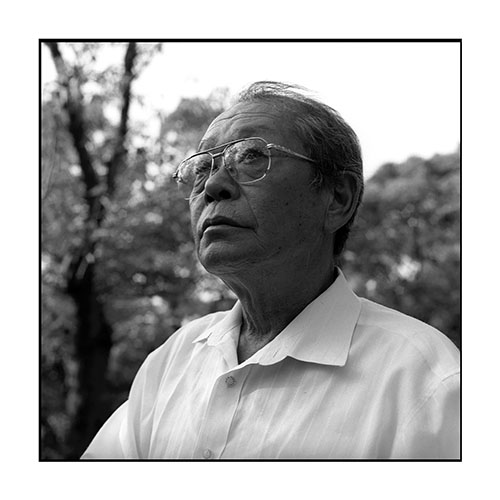
“I was 4 years old when the atomic bomb was dropped.
So I don’t know “normal life.”
I hated the war for a long time, but realized having a grudge does nothing.
I have to speak and leave messages to the next generation.”
-Hidetaka Komine
Yesterday I received the sad news that Hidetaka Komine passed away, a couple of days before his 84th birthday. I met Mr. Komine during the second day of my initial trip to Nagasaki. He was the fifth hibakusha, atomic bomb survivor, I met. I remember it clearly because he was an unforgettable and remarkable person. He left an impression even before we were introduced. When I was walking back into the Nagasaki Atomic Bomb Museum, I caught a glimpse of a man wearing a leather jacket and smoking a cigarette. He looked like he rode a Harley Davidson. Twenty minutes later, when it was time for my next interview and photograph, the man with the leather jacket walked in, it was Mr. Komine. He immediately started speaking and using his hands like I do, more direct and aggressive than any person I met in Japan. Even though I had no idea what he was saying, I knew he was interesting. He reminded me of the characters from my childhood in Brooklyn.
Mr. Komine lived a tough life, but he fought through the struggles and lived with dignity and pride. He could admit to the pain, anger, sadness, and regrets. There was no veil of secrecy in his words. I’m not sure I’ve ever met someone who was tougher, sincere, or more compassionate. This is what real strength is to me.
He became my friend from the first moment. I returned to Nagasaki many times, and he was always there to greet me, and developed a friendship with my translator Seiichi. On my second visit to Nagasaki in May 2010, I exhibited the first portraits at the Nagasaki Peace Museum so that everyone I photographed could see. At that point, the project was seen once in Tokyo and there wasn’t any interest from venues in Nagasaki. Izumi and I were persistent. When Mr. Komine came to the exhibition with the other hibakusha, we spoke about my trip to Dresden to photograph firebombing survivors. But I will always remember him speaking with another person I photographed and saying that he didn’t recognize them because “Paule made them look better in the photograph.” That was Mr. Komine’s personality, like a character from Brooklyn and not like anyone else in Japan.
“If I had not encountered the atomic bomb, I don’t know what kind of life was waiting for me.”
The atomic bomb was one of Mr. Komine’s first memories of life. He was the first to tell me that the life of an hibakusha was cut in two. The life before the atomic bomb, and then the sharp cut the moment after the bomb exploded. His entire life he was subjected to discrimination, and prejudice. One day as a child he had enough of the fierce bullying because the atomic bomb left him with injuries that made it painful to walk. He fought back, risking serious injury, but he considered it a salvation to stand up for himself.
It wasn’t until he was 50 years old that Mr. Komine publicly spoke about his experiences. He was ready earlier in life to speak than most hibakusha. It was an honor that Mr. Komine was my friend. He made me a better person, and had more compassion and strength in one of his fingernails than I have in my entire body. The world was a better place with him in it. He will be missed.
Tags: From Above, Gallery EF, Hibakusha, Hidetaka Komine, Nagasaki